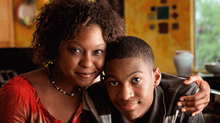Really Foul Language
I've never been much bothered by the use of what others usually think of as foul language. When I'm watching a movie, the seven forbidden words of the media sail right past me. Most are references to body parts and bodily functions for which we use dozens of acceptable synonyms all thetime, and, in context, they're primarily just noises people make when they're surprised or angry or distraught.
I'm always surprised when someone in my reading group objects to the "language" of the book we're reading. Invariably, I didn't even notice the offending words, and those who object have to point them out to me.
For years, though, I've been waging a one-woman war on another kind of foul language. It started when my daughters were toddlers. "Lulu isn't stupid," I'd tell Charlotte. "She's just younger than you and hasn't learned as much. And anyway, even if she were stupid, it would be mean to call her that.
"Well, she's a dummy then."
"That means the same thing," I'd say as I detached Lulu's baby claws from her sister's arms. "You wouldn't want someone to call you that, would you?"
"But I'm not stupid," she'd blithely retort. "Nobody'd ever call me that." Charlotte's always been a good arguer.
When the girls got to be school age, they added words like dope and retard to their vocabulary, and soon I was giving my foul language speeches not only to them but to the kids they brought home from school and the kids on their soccer teams and the kids at children's church.
nWhen I went back to teaching, I incorporated lessons on offensive language into my junior high and high school English curriculum.
"But we don't mean it that way," my students always told me in defense of words like idiot and moron and especially the ubiquitous retard. Even when I told them the history of those words, they resisted my teaching.
"It's just what everyone says," they insisted.
In the racist language part of my lesson, I told them that racial epithets amount to using references to people's ethnic heritage as a way of disparaging them as somehow less than you. They were okay with this idea until I told them that my husband Kris was offended when people used words like hick and redneck in reference to country people like him.
"That's stupid," they universally agreed. "It doesn't mean anything bad."
Back then, Kris was farming fulltime. Although routinely referred to among my acquaintances and in the graduate writing program in which I met him as "one of the smartest people I've ever met," Kris has always regarded farming as the most important and enriching work a person can do: stewarding the land, taking care of animals, raising food for the hungry. He opted out of a full-ride scholarship to the best graduate astrophysics program in the world to raise cattle, and the great disappointment of his life was when cattle prices dropped so low that only massive agro-businesses, which were more about making money than actually farming, could turn a profit.
"I'm a hick," one student told me, "and I don't mind being called that."
"That's because you haven't been called that by anyone who isn't also from the country. Wait till you are. You may feel different."
The first year composition textbook I use at the Christian university where I now teach includes a wonderful essay entitled "No Wonder They Call Me a Bitch" about a woman who researches and tastes a variety of dog foods to find out if they live up to their producers' advertising claims. Whenever I assign it, the title provides an opportunity for what I see as important spiritual formation. I decry the offending word, of course. My students often use the word themselves, but are always mortified to see it in the title of an essay assigned for class. In their syllabus, for Pete's sake. They're astonished that it's their use of the word, not the pun in the title, that I find offensive.
"If you call someone a bitch, you're not just saying you don't like her," I tell them. "You're saying she's angry or forthright and a woman and that it's not okay for a woman to be angry or forthright. And you're also saying that, despite your own anger and forthrightness in calling her that, you're better than she is."
I list all the words they use that do the same thing—words that use some feature of another's cultural background or identity as belittlement.
"That's what all of what I call ?foul language' comes down to," I tell them. "Not language that refers to unsavory matters like defecation and sexual intercourse, but language that, regardless of the speaker's motives, demeans another person. Language that says, I'm better—smarter, nicer, more refined, more Christian—than you are. Language that seeks to disempower someone."
I take them to Jesus' startlingly harsh teaching on the subject: "… anyone who says to his brother, ?Raca,' is answerable to the Sanhedrin. But anyone who says, ?You fool!' will be in danger of the fire of hell" (Matthew 5:22).
Jesus is talking about anger in general here—how it's tantamount to murder—and I always expect some biblical studies student to say so and argue that, if they aren't using words like bitch and retard and hick in anger, then Jesus' teaching doesn't apply. That's never happened, but I have my answer ready: The language we use is the expression of who we are, whether we mean it to be or not.
"Consider the word retard," I tell my students. "You would never think of using that word in the presence of, say, your friend's developmentally delayed sister, right? Or, if you did let the word slip by accident, you'd be embarrassed. Why is that? Isn't it because using the word—even in jest—impugns those among us who, through no error of their own, are what used to be called ?retarded'? Secretly, intuitively, you know the word belittles them, so you avoid it. That knowledge informs the word even when your friend's sister isn't around."
Last night I pontificated on this subject in replying to an e-mail from a sunny, sweet-spirited student who had used the word retard in reference to herself. "Pass on this information, gently, to your friends and acquaintances and especially to your future students," I concluded. "You'll have to do it more than once, though. I still haven't eradicated the word and its ilk from my daughters' and their friends' and my students' vocabularies."
I was thinking about my e-mail this morning during my daily run on a skinny back road near my house. Up ahead of me, as I mused, a man in what my husband's mom calls a rattlety-bang pickup prepared to enter the road from a driveway. He pulled partway out and then, although I was still a ways off, just sat there.
"What? You're waiting till I get in front of you, you retard, and then you're going to pull out and run me over?" I groused in my head as I slowed to a stop. Just then, a car whooshed past me from behind. Had the pickup pulled out when I wanted it to, our three paths would have coincided, and I might have been killed.
So eager, I am, to judge and preach. So quick to attack. It'll take a daily—hourly, minutely—dose of grace to get me through this life alive.
Copyright © 2010 by the author or Christianity Today/Kyria.com.
Click here for reprint information.
Read more articles that highlight writing by Christian women at ChristianityToday.com/Women
 Read These Next
Read These Next

 Beyond the Birds and the Bees3 conversations to have before your child goes off to college
Beyond the Birds and the Bees3 conversations to have before your child goes off to college
 How to Answer Kids' Tough QuestionsQuestions about God can be faith builders—if we handle them correctly
How to Answer Kids' Tough QuestionsQuestions about God can be faith builders—if we handle them correctly








 Homepage
Homepage